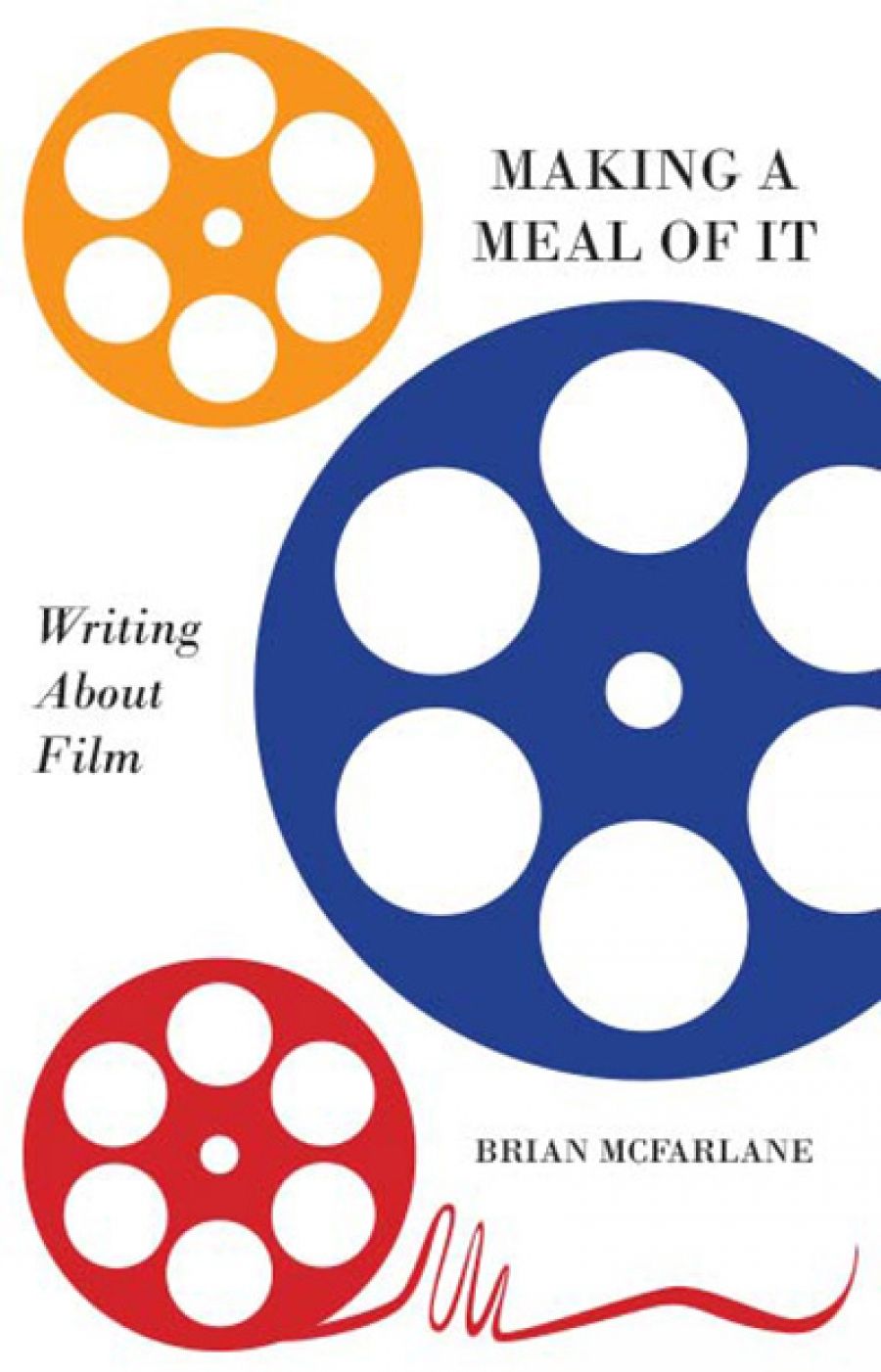
- Free Article: No
- Contents Category: Film
- Custom Article Title: Varun Ghosh reviews 'Making a Meal of It: Writing about film' by Brian McFarlane
- Custom Highlight Text:
One of my favourite podcasts at the moment is called The Rewatchables. It deconstructs movies (mainly from the 1990s and 2000s) and offers an enjoyable mix of amusement, nostalgia, and insight. It also speaks to the desire, particularly strong in the internet age, to hear what other people think about content already ...
- Book 1 Title: Making a Meal of It
- Book 1 Subtitle: Writing about film
- Book 1 Biblio: Monash University Publishing, $29.95 pb, 380 pp, 9781925523416
The first part of the book, ‘Starters’ , is a loosely connected and chronological assortment of film and book reviews. McFarlane’s impressive qualities as a critic are evident from the start. He has the ability to go right to the heart of a film or scene and explain its significance with insight. Of Hope and Glory, a 1987 film about a family living in London during the Blitz, McFarlane writes: ‘Ah, one thinks, a rites-of-passage movie, but the nostalgia for childhood itself is recognised for what it is. Childhood is seen as a time of incomplete understanding and the film is wry and tough enough to see that adults mostly botched things as well.’ McFarlane also has a good turn of phrase when skewering. Of The Great Gatsby (2013), he writes: ‘Luhrman has taken a slim, elegant book and made a fat film from it.’ Of a book about Annette Kellerman: ‘No cliché is left interred.’
The second part – comprised of longer essays and appropriately titled ‘Mains’ – is the real pleasure of the book. Across a series of essays about the film biography industry and films that deal with artists and ideas, McFarlane’s experience and erudition come to the fore. He can be, at turns, sensitive and unforgiving. Describing the challenges of being ‘a Hollywood staple’ – say, Katharine Hepburn or Henry Fonda – he writes: ‘To be as universal an icon as a film star is makes preposterous demands on the sanity, balance and humanity of the often otherwise unremarkable human being just beneath the glamorous surface.’ On the hollowness of epics such as Troy (2004), Alexander (2004), and King Arthur (2004), McFarlane is direct and polemical:
I resent the sheer mad waste of these films. I resent how little there is to show for all the time and effort as well as money that has gone into them. I resent the way they take on big themes and vulgarise and emaciate them in their search for the huge audiences they need, and, I fear, often find.
In ‘The Critic as Artist’, Oscar Wilde posited that the highest criticism is really ‘the record of one’s own soul’ and a strong sense of McFarlane’s own preferences and judgements emerge through the book. He deprecates films that patronise the audience or oversimplify their subject matter, preferring what he calls ‘films for grownups’. Of Mrs Palfrey at the Claremont (2005), he writes that ‘it is a film that assumes that what goes on between people is about the most interesting narrative topic to be had’. McFarlane clearly agrees with that assumption.
 A scene from Troy, 2004 (Warner Bros. Entertainment)
A scene from Troy, 2004 (Warner Bros. Entertainment)
The treatment of films about Australia and sense of what it is to be an Australian is another highlight. In a thoughtful, jingoism-free review of the film Gallipoli (1981), he observes: ‘Gallipoli is not, then, a “war film” so much as a film about war; about the kinds of attitudes Australians and particular individuals took towards it in 1915: about, in a broader sense, what it felt like to be Australian then – and perhaps still does feel like.’ On the portrayal of country towns in Australian film, McFarlane writes with real feeling.
Too often, the townspeople are depicted as essentially out of touch with the mainstream of contemporary life or … seen as being, in their sly, simple way, actually sharper than city folks. Both views seem to me, in their apparent opposition, to be equally patronising; both seem equally remote from treating the inhabitants of country towns as individuals who are as worthy of sustained attention as bush heroes or city sophisticates.
Perhaps because it does have significant strengths, Making a Meal of It can be a frustrating book. The third part – ‘Afters, or Just Deserts’ – contains a series of elegiac pieces that ‘are essentially more personal than critical’. It is an indulgence. I also found myself wanting the author to deploy his extensive scholarship and skill as a writer to draw deeper insights and fresh conclusions about film, particularly Australian film. Yet, in its present form the book is too long at nearly four hundred pages, and the chronological structure is tedious. At times, this structure actually seemed to emphasise the pointlessness of reading a decades-old review about a moderately good movie. More careful curation was required.
 Mark Lee and Mel Gibson in Gallipoli, 1981 (Associated R&R Films)
Mark Lee and Mel Gibson in Gallipoli, 1981 (Associated R&R Films)
Minor errors tend to irritate, particularly when McFarlane himself is critical of other authors for sloppiness. Australian actress Elizabeth Debicki is rendered as ‘Dubecki’. Less forgivably, McFarlane misquotes one of Archy Hamilton’s more memorable lines in Gallipoli – ‘As fast as a leopard’ becomes ‘Like a leopard’.
Nevertheless, at a time when the cinemas seem crowded by studio tent-poles and transparent Oscar bait, Brian McFarlane’s Making a Meal of It is a welcome reminder of the importance of films that ‘take serious subjects and deal with them intelligently against diverse backgrounds’.


Comments powered by CComment